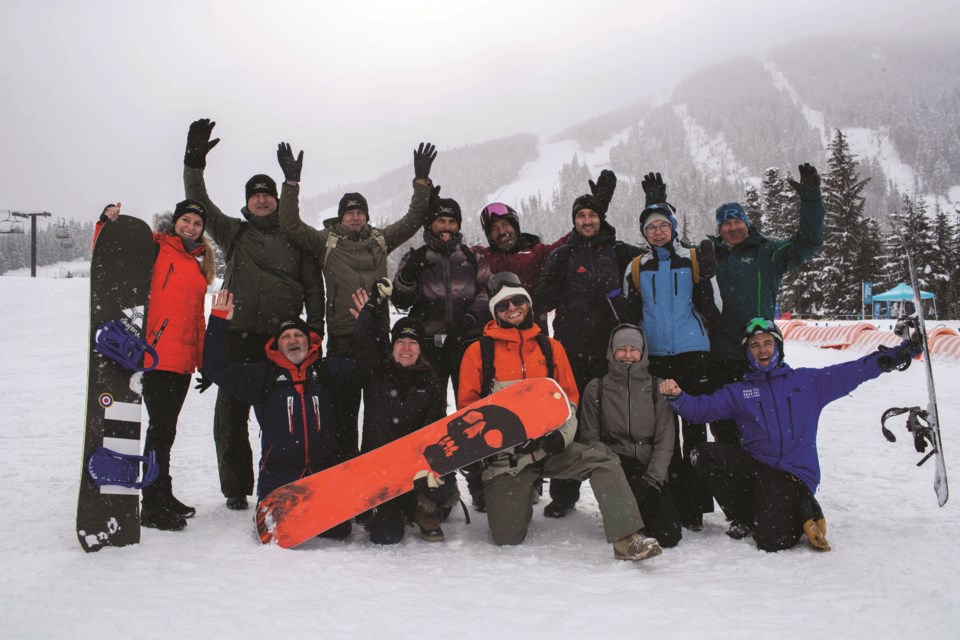The 2025 Invictus Games will be the first of its kind to include both winter and summer sports, as well as the first time that the flagship sporting event for ill and injured military personnel graces British Columbia. In advance of the competition, Whistler recently hosted another “first”: an Adaptive Winter Sports Camp for the team managers of participating nations.
Not every country is familiar with winter athletics. For that reason, the Invictus Games Vancouver-Whistler put on a training camp from Feb. 26 to March 4 intended to familiarize participants with alpine and cross-country skiing, snowboarding, biathlon, sit-skiing, wheelchair curling and skeleton.
Participating Nations Team Managers (PNTMs) from Germany, Poland, Colombia, Estonia, and the Netherlands took part, as did Canadians, Americans, Brits and Australians who were already in Whistler for Soldier On’s Allied Winter Sports Camp: a separate event that serves as a training ground for athletes who represent Canada at the Games.
“The goal behind [the PNTM Camp] is to educate people on what winter is,” said Peter Lawless, CEO of the 2025 Invictus Games. “Twelve months a year, no matter where you live, getting outside and active is good on your journey of recovery. Even if you’re not a winter nation, you can still be participating in traditional [winter] sports such as setting up a curling rink in a gym or using a Nordic ergometer to train for cross-country skiing.”
Throughout the week, PNTMs and guests of Soldier On spent time at Olympic Station on Whistler Mountain, Whistler Olympic Park (WOP), the Whistler Sliding Centre (WSC) and the Vancouver Curling Centre. According to Chelsey Walker, director of Whistler operations for the Games, PNTMs were familiarized with these facilities ahead of time, so they will be ready to bring athletes here in two years.
No new venues are going to be built for the Invictus Games Vancouver-Whistler. Instead, organizers and athletes will be taking full advantage of the area’s existing Olympic venues.
“The beauty of Whistler having hosted the 2010 Olympic and Paralympic Games is that the venues are there,” said Lawless. “They’re world-class facilities, they’re world-class mountains, and we have the luxury of just sort of dropping in and putting on our own world-class event.
“One of our messages to the PNTM managers is that: you are not defined by your injury, and you are what you choose to be,” he continued. “[For example], no one has trained on skeleton before, and they’re going to go headfirst down the skeleton track to see who’s going to be the fastest. I think there’s a powerful message in there about going off into a new future, regardless of the circumstances.”
Also on the agenda was an off-snow session covering how to ready off-season and warm-climate training options like roller skis, echolocation rifles and the aforementioned Nordic ergometers.
Overall, Invictus Games representatives are very pleased with how the first PNTM Camp unfolded, and hope that the team managers involved will spread the word within their countries and to others as well. All of the 20-plus nations slated to compete in the 2025 Games were invited this year, and next year’s camp is already expected to have a robust turnout.
Lawless has been deeply involved with Soldier On for years. He knows the toll that military life can take on people, but he’s also seen many service members and veterans find community and renewed purpose through athletic and creative endeavours. For him, the Invictus Games represents another golden opportunity for soldiers around the world to take ownership of their recovery.
“This is about using sport as a vehicle for recovery,” Lawless said. “We all know about the transformative power of sport: it can change people, it can change communities, it can change nations.
“When you go off to serve your country and you’re injured, your family is injured as well. I think [the Invictus Games] take a very strong view on the importance of bringing families back together and giving tools to allow for that.”
The idea of a host organizing committee offering to prepare coaches and managers from other countries in advance of an international contest may seem odd to those familiar with the Olympics or a World Championships in any given sport. That’s why it’s important to understand that the Invictus Games cannot be viewed through the same lens as more traditional competitions.
“This has nothing to do with how fast you go—it’s that you go,” Lawless emphasized. “The Invictus Games themselves are never the end of the journey. They’re really a celebratory moment in stepping off into the next part of your journey.”




